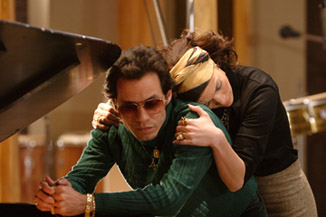Movie Review: El Cantante
By Tom Houseman
August 9, 2007
BoxOfficeProphets.com

But in this film, passion is not confused with reverence. While Ichaso clearly loves the music in the film (how could he not? It is spectacular.) he never reveres Hector Lavoe. Unlike the musician biopics Ray and Walk the Line, Lavoe is not seen a good man with flaws that he overcomes through the love of his family, his wife, and his music. No punches are pulled as we see Lavoe fall deeper and deeper into his addiction, jeopardizing his career and ignoring his family. There is no happy ending for Hector Lavoe, and the film gives no false hope. Lavoe was never able to overcome his addictions to heroin and cocaine, and in 1993, he died of AIDS from sharing needles.
El Cantante is not a perfect film; it is so ferocious and fast-paced that it was bound to hit a few sour notes, and towards the end, when Lavoe's inevitable spiral towards death is near, the film slows down and even drags, but the power of the story, the characters, and the numerous music sequences are so overwhelming that it is easy to overlook the flaws. The cinematography is perfect, capturing the milieu of New York in the '70s and '80s in gritty detail. There is no beauty in the city we see, except when people are able to forget their problems and submerge themselves in the songs of Lavoe. The beaches of Puerto Rico are a sharp contrast to the rough streets of Manhattan, and are gorgeously captured, make them seem like a dream compared to the harsh reality of New York. The editing is rapid and feral but never jarring; it makes sense in the world of Hector Lavoe to never look at anything for more than a moment before speeding along to the next.
Considering the stars of the film, some might be suspicious of the performances, but only a few minutes into El Cantante, all fears will have been assuaged. Marc Antony is such an incredible performer that whenever he is on stage, he is a magnet drawing all attention towards him. His stage sequences are magnificent, and his performance as Lavoe is shockingly good, considering Antony's minimal acting background. We never lose touch with the real Lavoe even as he loses the fight against his addiction. We hate him for what he is doing, but we pity him; we wish he could save himself, which makes the final loss even more heartbreaking. Jennifer Lopez has clearly spent the last ten years convincing the world that she cannot act, just to make her outstanding performance in El Cantante even more surprising. Lopez's Puchi is no foil to Lavoe, nor a voice of reason. She embraces his reckless lifestyle while at the same time chastising him for it, and she never stops loving him. The audience can most relate to Puchi, trying to stop her husband from destroying himself while at the same time helping him. Lopez is both charming, wild, sweet, and gut wrenching, sometimes all at the same time.
These contradictions of character are what make El Cantante so fascinating. Lavoe sings about love before visiting his mistress, embraces his family before rejecting them, then comes back, broken. He blames his father for abandoning him, but is a terrible father himself. Lavoe and his life are one big contradiction, but one we are desperate to unravel, and even when, at the end, we are left with tattered pieces of a life lived to its fullest and still wasted, we get no closure, no "Rosebud" revelation. We are left forsaken, bereaving our loss, and shell-shocked by everything we have been through in just two hours. We get everything, and yet, somehow, desperately want more, because we have hopelessly fallen in love with Hector Lavoe and his music, music we won't ever get out of our heads.